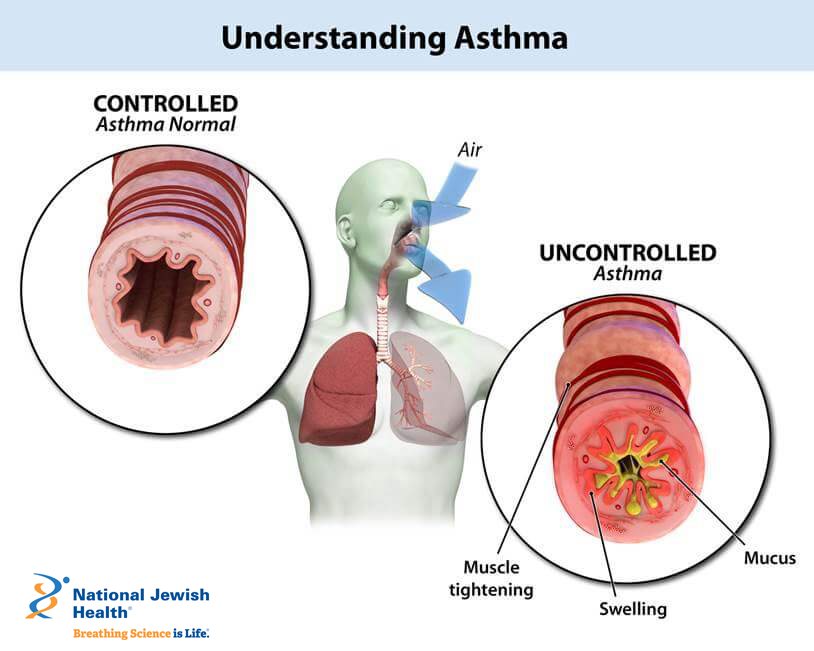What Is Asthma?
For some children with asthma, their first asthmatic experience can be a frightening asthma attack. Heavy wheezing, a tight chest and shortness of breath can quickly catch their active young bodies off guard.
 For others, asthma can present subtly, with exercise intolerance or a chronic cough. Asthma is a chronic lung disease, sometimes worrisome and inconvenient, but a manageable condition. With proper understanding, good medical care and monitoring, you and your child can keep asthma well controlled. That’s our treatment goal at National Jewish Health, to teach patients and families how to manage asthma, so that they can lead full and productive lives.
For others, asthma can present subtly, with exercise intolerance or a chronic cough. Asthma is a chronic lung disease, sometimes worrisome and inconvenient, but a manageable condition. With proper understanding, good medical care and monitoring, you and your child can keep asthma well controlled. That’s our treatment goal at National Jewish Health, to teach patients and families how to manage asthma, so that they can lead full and productive lives.
If your child has asthma, he or she is not alone. In the United States, asthma affects 25 million people. It is the most common chronic disease of childhood. Today, 6 million children have asthma.
What Are the Goals of Asthma Treatment?
Your child should be able to:
- Participate in activities, including physical activity, without asthma symptoms
- Sleep through the night without asthma symptoms
- Have normal or near normal lung function
- Have few, if any, emergency room visits and hospitalizations
- Have few, if any, side effects from the medications taken
- Feel good about his or her asthma care
Typical Changes in the Airways Include:
Asthma, also known as reactive airway disease, is defined as a chronic lung condition with:
- Inflammation (swelling of the airways)
- Increased sensitivity of the airways to a variety of things that make asthma worse
- Obstruction of airflow

Let’s look take a closer look at the airways in the lungs with controlled and uncontrolled asthma.
Inflammation
Recent research has shown that inflammation (swelling) of the lining of the airways is the most common chronic feature of asthma. When they are stimulated, certain cells lining the airways produce chemical substances (mediators), which leads to inflammation and excessive mucus. This causes the airway lining to swell and narrow. The inflammation may last for weeks following an episode. Most people with asthma have some degree of inflammation all of the time.
Some long-term control medications can help prevent and reduce inflammation.
Increased Sensitivity
Another characteristic of asthma is increased sensitivity of the airways. When inflammation occurs in the airways, they become more sensitive (or "twitchy"). When there is less inflammation, the airways are less sensitive, and your child is less likely to have asthma symptoms when exposed to things that make asthma worse.
Airway Obstruction
In addition to inflammation and thick mucus production, further airway obstruction can occur with asthma. This obstruction is caused by tightening of muscles that surround the airways, called bronchospasm.
Bronchospasm causes further narrowing of the inflamed airways.
Inhaled quick-relief medications are generally very effective in reversing a bronchospasm.